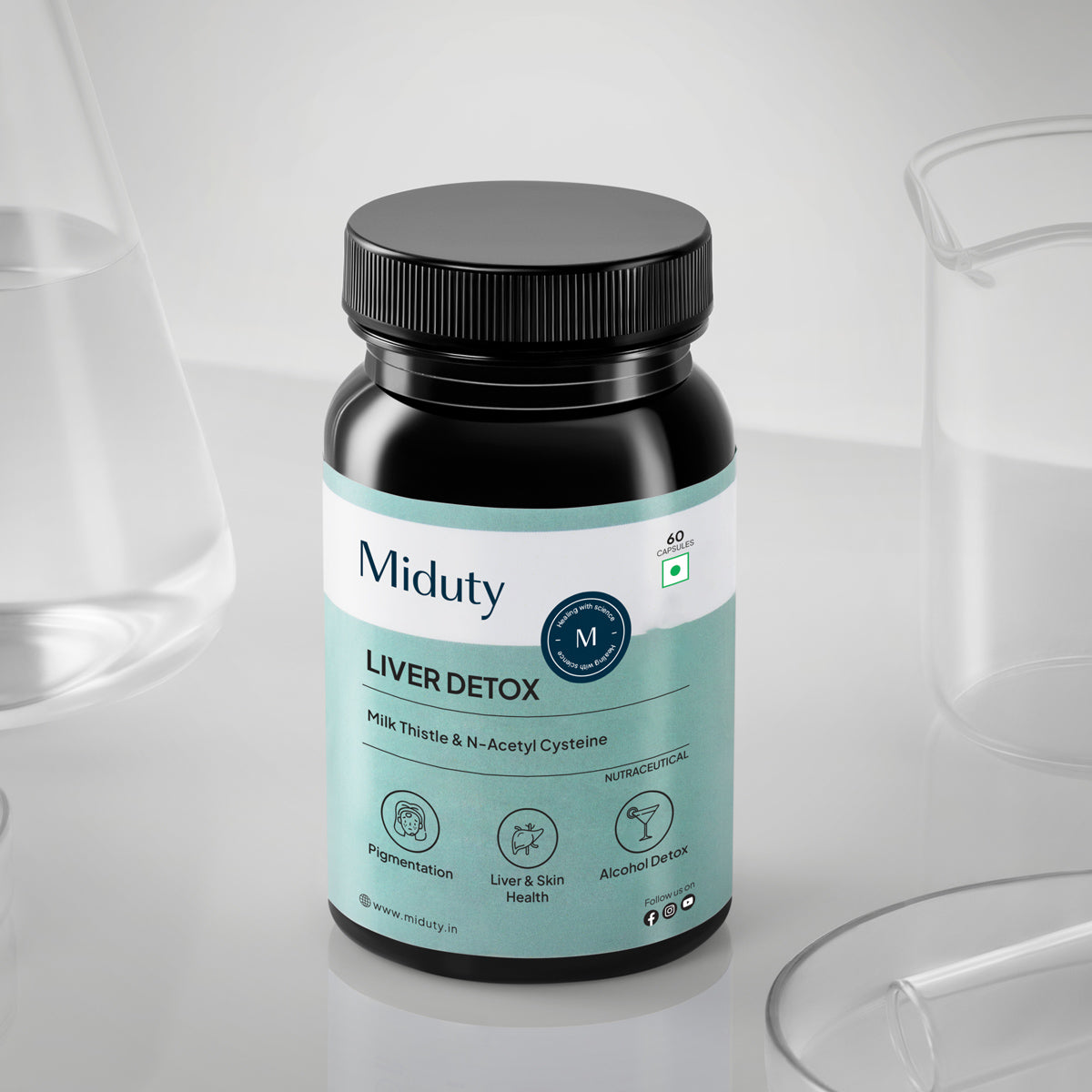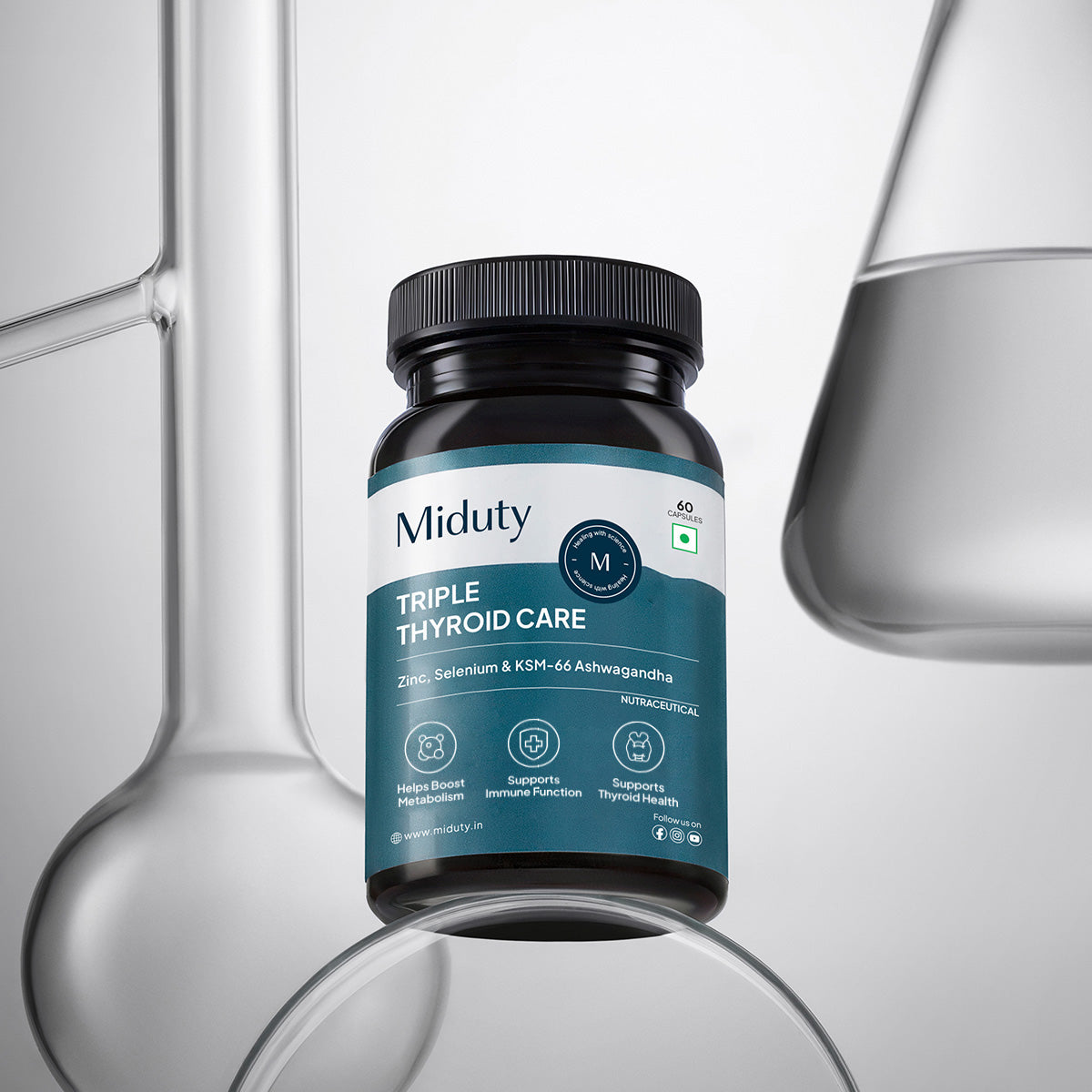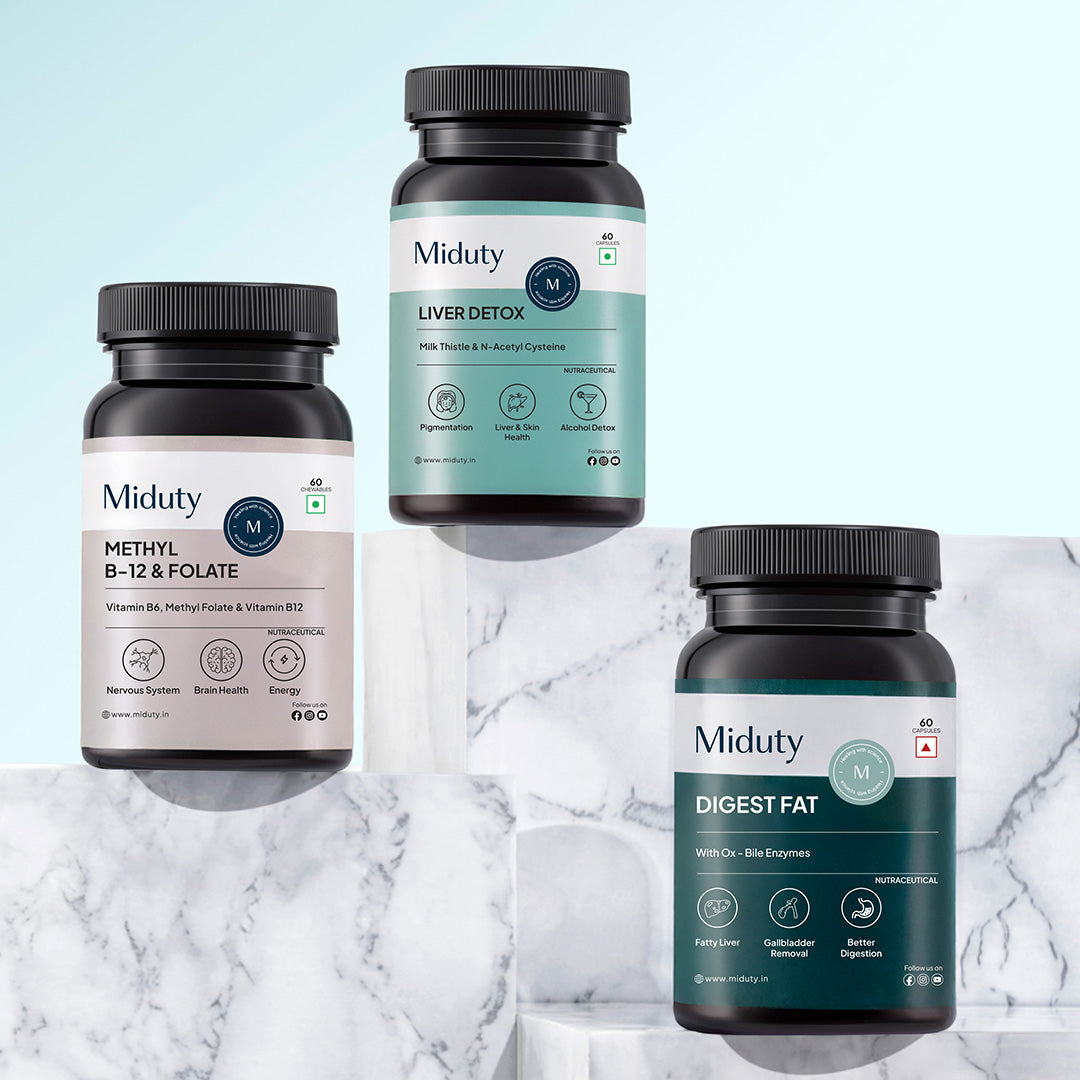
Understanding the Link Between Hypothyroidism and Liver Dysfunction
Key Takeaways
1. Thyroid and Liver: A Hidden Health Duo – When one slows down, the other suffers. Their connection is stronger than you think.
2. Silent Symptoms, Serious Impact – Fatigue, weight gain, and high liver enzymes could all point to an underlying thyroid-liver link.
3. Iodine and Kelp for Thyroid Boost – Natural sources like sea kelp help thyroid hormone production, but balance is key.
4. Milk Thistle and NAC for Liver Love – These supplements support detox and repair, especially when your liver is under stress.
5. Healthy Habits Heal – An anti-inflammatory diet, regular exercise, and proper hydration are essential to support both organs naturally.
Hypothyroidism and liver dysfunction are like two quiet roommates that rarely speak but affect each other's routines deeply. The thyroid, a butterfly-shaped gland at the base of the neck, produces hormones that regulate nearly every organ, including the liver. Meanwhile, the liver plays a pivotal role in converting thyroid hormones into their active form. When one starts underperforming, the other often feels the effects.
For instance, low thyroid hormone levels can slow the liver's ability to break down cholesterol, detoxify the blood, or metabolize medications. This slowdown can cause elevated liver enzymes, fatty liver disease, or even jaundice in severe cases. Conversely, liver dysfunction can hinder the conversion of T4 into T3, the active thyroid hormone, further aggravating hypothyroid symptoms.
Recognizing the connection between these two organs isn't just interesting, it's essential. Understanding this relationship can lead to earlier diagnosis, more effective treatment, and a greater appreciation of how interconnected the body truly is.
What is Hypothyroidism?
Hypothyroidism is a condition in which the thyroid gland fails to produce sufficient levels of thyroid hormones—mainly thyroxine (T4) and triiodothyronine (T3). These hormones are essential for regulating the body's metabolic processes. Without them, every cell, tissue, and organ operates less efficiently, including the liver.
You might imagine your thyroid like the thermostat for your entire body. When it's not set high enough, everything starts to slow down. You feel tired, gain weight, and experience symptoms like dry skin, constipation, and even depression. In fact, millions live with hypothyroidism and don't even know it because the symptoms are often dismissed as signs of aging or lifestyle issues.
Causes and Risk Factors for Hypothyroidism
Hypothyroidism doesn't just appear out of nowhere. Here are the most common causes:
1. Autoimmune diseases – Hashimoto's thyroiditis is the most common cause. It's when your immune system mistakenly attacks the thyroid gland.
2. Thyroid surgery – Removing part or all of the thyroid can result in a drop in hormone production.
3. Radiation therapy – Particularly for cancers in the neck or head, which can damage the thyroid.
4. Medications – Some drugs, including lithium and amiodarone, interfere with thyroid function.
5. Iodine imbalance – Both too much and too little iodine can affect hormone production.
You may be at greater risk if:
- You're a woman, particularly over age 60
- You have a family history of thyroid disorders
- You suffer from other autoimmune diseases like Type 1 diabetes or lupus
- You've been pregnant recently (postpartum thyroiditis)
Many of these factors also affect liver function. For example, autoimmune diseases don't always stay confined to one organ—they can attack both the thyroid and the liver.
Common Symptoms of Hypothyroidism
One of the reasons hypothyroidism goes undiagnosed for so long is because its symptoms are vague and develop slowly. You might chalk them up to aging, stress, or poor diet. However, if you're experiencing a combination of these symptoms persistently, your thyroid might be to blame:
1. Chronic fatigue – You feel tired even after a full night's sleep.
2. Weight gain – Especially if you're eating normally or dieting.
3. Constipation – A sluggish metabolism affects digestion.
4. Cold sensitivity – You feel chilled even in warm environments.
5. Puffy face – Especially around the eyes.
6. Dry skin and thinning hair – A result of poor circulation and nutrient delivery.
7. Slow heart rate – Your whole system is moving at a slower pace.
8. Depression or anxiety – Hormonal imbalances affect mood regulation.
9 . Irregular periods or fertility issues – Thyroid hormones play a role in reproductive health.
What many don't realize is how these symptoms overlap with liver dysfunction. For example, fatigue and weight gain are common in both conditions. Elevated liver enzymes found in blood tests can sometimes be your first clue that something is off, even before thyroid symptoms appear.
Liver Function and Its Importance
The liver is your body's unsung hero. It's the second-largest organ and performs over 500 vital functions every day. You can think of it as your internal chemical factory, janitor, and security guard rolled into one. Its major roles include:
- Filtering toxins from your blood
- Producing bile to aid in digestion, especially fats
- Storing glycogen for energy between meals
- Regulating blood clotting
- Metabolizing drugs and hormones, including thyroid hormones
A healthy liver means better digestion, hormonal balance, and immunity. But if it's underperforming, you might notice bloating, fatigue, or yellowing of the skin and eyes (jaundice). And here's the kicker: the liver helps activate and break down thyroid hormones. So if your liver is sluggish, it could make a hypothyroid condition even worse.
Signs of Liver Dysfunction
- Liver dysfunction doesn't always scream for attention—it whispers. But when it does get loud, here's what it might say:
- Fatigue and weakness
- Loss of appetite
- Yellowing of the skin and eyes (jaundice)
- Dark urine and pale stools
- Swelling in the legs and abdomen
- Itchy skin
- Nausea or vomiting
How Hypothyroidism Affects Liver?
Hypothyroidism doesn't just slow down your metabolism; it also drags down your liver's performance. The liver and thyroid hormones are intricately connected, and when the thyroid is underactive, it can seriously impact how the liver does its job. Why? Because thyroid hormones regulate metabolism at a cellular level—including the liver's energy usage and function.
When you have low levels of thyroid hormones, the liver receives fewer metabolic signals to process cholesterol, glucose, and fats efficiently. This can lead to:
- Elevated liver enzymes due to sluggish bile flow
- Non-alcoholic fatty liver disease (NAFLD) from increased fat accumulation
- Delayed drug metabolism, which may lead to medication buildup in your system
Hypothyroidism can also reduce the production of bile, a digestive fluid that helps with fat absorption. Less bile means more strain on the liver and digestion as a whole. The result? You feel bloated, tired, and heavy inside and out.
What's more, the liver converts the thyroid hormone T4 into its active form T3. If liver function is compromised, even a normal T4 level won't be enough, and you'll still feel hypothyroid symptoms. It's a double-edged sword where one organ failing can make the other's job even harder.
Role of Thyroid Hormones in Liver Metabolism
The thyroid hormones T3 and T4 are key regulators of metabolic processes, including those in the liver. When these hormones are in balance, they help the liver:
- Break down cholesterol
- Process drugs and toxins
- Metabolize carbohydrates and fats
- Maintain healthy enzyme activity
But when thyroid hormone levels drop, everything in the liver slows down. The metabolism of fats gets disrupted, leading to fatty liver buildup. This condition, known as NAFLD, is now one of the most common liver disorders worldwide and is increasingly linked to thyroid dysfunction.
Reduced thyroid function can also affect blood flow to the liver, leading to poor oxygenation and nutrient delivery. In extreme cases, this can result in liver cell damage or fibrosis.
Furthermore, hypothyroidism alters the liver's ability to handle oxidative stress. That means toxins and free radicals can accumulate more easily, promoting inflammation and cellular damage.
Managing Liver Dysfunction in Hypothyroidism Patients
Let's be honest, no magic pill can replace the power of a healthy lifestyle. When you're dealing with hypothyroidism and liver dysfunction together, your diet and daily habits matter more than ever. These two conditions thrive on metabolic imbalance, poor digestion, and inflammation, things your lifestyle can directly impact.
Start with these core principles:
1. Adopt an anti-inflammatory diet: Load up on leafy greens, berries, fatty fish like salmon, and whole grains. Avoid processed foods, refined sugars, and hydrogenated oils that promote liver fat accumulation and inflammation.
2. Limit alcohol: Even social drinking can overburden an already struggling liver. If your enzymes are elevated, avoiding alcohol altogether is best.
3.Go easy on fats: Especially saturated fats found in red meat and fried food. Instead, focus on healthy fats from avocados, nuts, seeds, and olive oil.
4. Increase fiber intake: Fiber helps regulate blood sugar, reduce cholesterol, and support detox—key for both thyroid and liver health.
5. Stay hydrated: Water is essential for detox and hormone transport. Aim for 8–10 glasses a day.
6. Exercise regularly: It boosts metabolism, supports thyroid hormone activity, and helps burn liver fat
7. Prioritize sleep: Poor sleep reduces thyroid efficiency and increases liver inflammation.
8. Reduce stress: Chronic stress impairs both organs through cortisol overproduction, which interferes with hormone balance and immune function.
Best Supplements for Hypothyroidism and Liver Dysfunction
Some herbs and supplements can offer gentle support to the thyroid and liver when used wisely. While they're not a replacement for medication, they may enhance overall wellness when integrated safely into your routine.
For Thyroid Support:
-
Ashwagandha – An adaptogen that supports thyroid hormone production and reduces stress
-
Selenium – Important for thyroid hormone conversion; may help reduce thyroid antibodies
-
Zinc – Supports thyroid function and immune regulation
For Liver Support:
-
Milk thistle – Contains silymarin, which helps repair liver cells and reduce inflammation
-
Turmeric (curcumin) – A powerful anti-inflammatory that can aid liver detox
- Dandelion root – Acts as a mild diuretic and liver stimulant
A supplement containing a blend of N-Acetylcysteine (NAC), selenium, and iodine can support liver detoxification, reduce oxidative stress, and promote thyroid function, key elements in managing fatty liver disease. This powerful trio works synergistically to enhance liver repair and metabolic health.
Conclusion
Hypothyroidism and liver dysfunction may not seem connected at first glance, but they're closely linked in ways that can quietly erode your health. Together, they affect your metabolism, energy levels, digestion, and more. The good news is, with awareness and proactive care, you can manage both effectively.
By paying attention to symptoms, monitoring your health through regular tests, and adopting a balanced lifestyle, you can break the cycle of dysfunction and start feeling like yourself again. Don't underestimate the power of food, movement, rest, and good medical guidance, they're the true pillars of healing.
Frequently Asked Questions on Hypothyroidism and Fatty Liver?
Q1 - What is the connection between hypothyroidism and the liver?
The liver converts inactive thyroid hormone (T4) into its active form (T3), and a sluggish thyroid can slow liver detoxification, creating a feedback loop that worsens both conditions.
Q2 - What does thyroid hormone do in the liver?
Thyroid hormones regulate liver metabolism, bile production, and the breakdown of cholesterol, toxins, and hormones.
Q3 - How to detox liver and thyroid?
Support both organs by reducing processed foods, managing stress, staying hydrated, and incorporating nutrients like selenium, zinc, iodine, and liver-supportive herbs like milk thistle and NAC.
Q4 - Can hypothyroidism be cured?
While not always curable, especially if caused by autoimmune conditions like Hashimoto's, hypothyroidism can often be effectively managed through medication, nutrition, and lifestyle changes.
Q5 - What major organ is affected by hypothyroidism?
The thyroid primarily affects the metabolic function of nearly every organ, but the heart is one of the most impacted, with potential effects on heart rate, cholesterol, and blood pressure.
References












